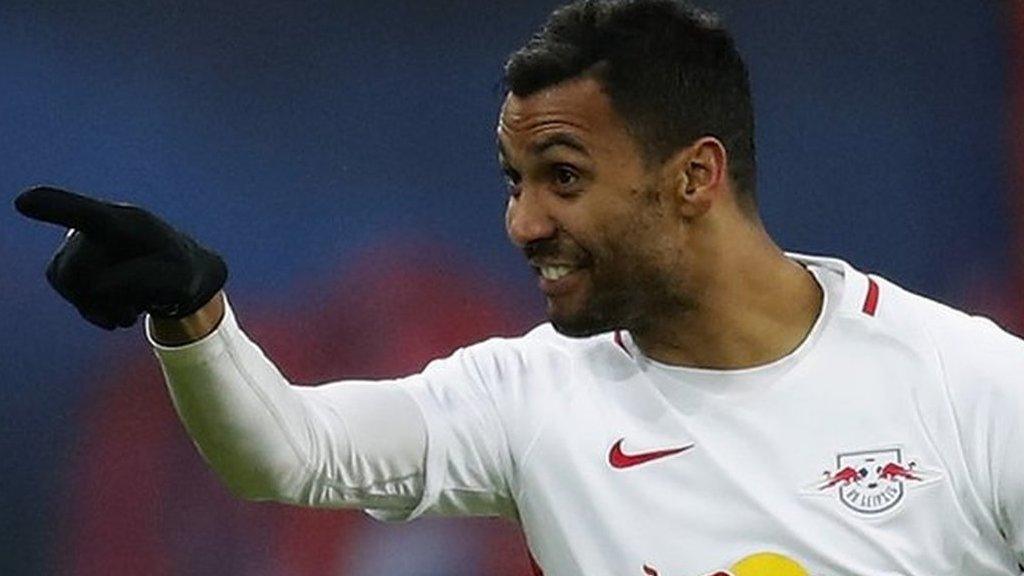Glasgow Warrior Samuela Vunisa's journey from chicken factory to Scotstoun
- Published
- comments
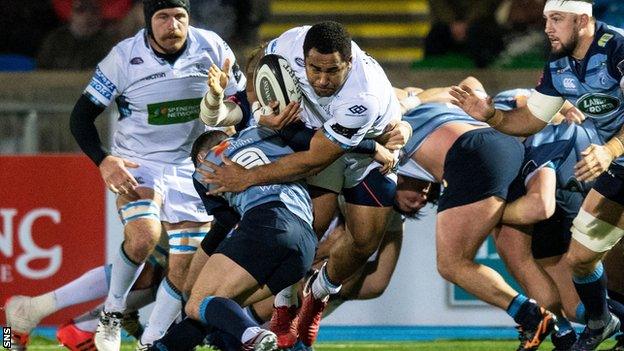
Hulking back-row Samuela Vunisa scored his first try for Glasgow Warriors in their win over Cardiff Blues
Pro14: Edinburgh v Glasgow Warriors |
|---|
Venue: Murrayfield Stadium, Edinburgh Date: Saturday, 23 December Kick-off: 17:10 GMT |
Coverage: Live on BBC Alba and BBC Radio Scotland |
Samuela Vunisa ambles into the Scotstoun press room on legs as broad as oak trunks, each bearing the distinctive scars of battle.
Those monstrous thighs have seen plenty combat, carrying the hulking Fijian on a merry voyage from the little neighbourhood of Tacirua to the western tip of New Zealand's North Island, onwards to central Italy then the galacticos of Saracens, the Rugby World Cup and now to Glasgow and Dave Rennie's Warriors.
To Vunisa, Fiji will always be home, even though he has 11 caps for Italy and has logged almost as much time following this nomadic trail as he has on the Pacific archipelago.
The number eight talks fondly of the early days, of carefree afternoons playing with friends and of his island heroes. Men whose brilliance thrilled the rugby world. Men such as the sorcerer of sevens, Waisale Serevi, and the fearsome rapier, Marika Vunibaka.
"What they did for the country, it put Fiji on the map," Vunisa says. "What they were doing made people happy - they could see how much it meant to the country and we wanted to be like that too.
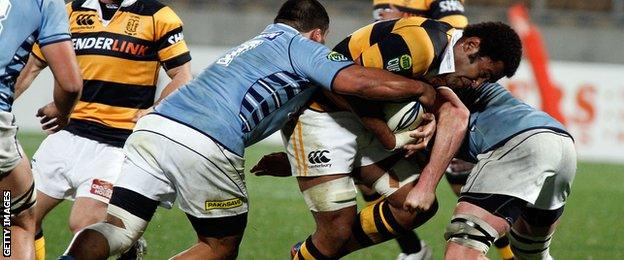
Vunisa began his professional career with Taranaki in New Zealand
"Any empty space, we would put an imaginary field, shape a bottle or paper like a ball and throw it around.
"It was a religion to us; playing rugby, watching rugby, imitating Fijian players. That was where everything started - out with the mates, playing, having fun."
And that's what rugby was for a time - an obsession, but at its core, a pursuit of enjoyment. Everything changed when 16-year-old Vunisa was spotted by a scout visiting from New Zealand and the offer of a scholarship to one of the nation's most prestigious schools was put before him.
His classmates, the current London Irish centre, Asaeli Tikoirotuma, Tevita Cavubati of Newcastle and Waisake Naholo, now a World Cup-winning All Black and one of the game's most devastating attackers, were also approached. All accepted.
Off they went, swept away from all that was familiar and comfortable and into the regal setting of Wanganui Collegiate School, a venerable Anglican academy once attended by Prince Edward.
These were formative years for Vunisa and his clutch of teenage Fijian brothers. Wealth and status surrounded them.
"In Fiji, you're pretty much living at home from when you're a baby to maybe 21," he says. "Mum and Dad are always there.
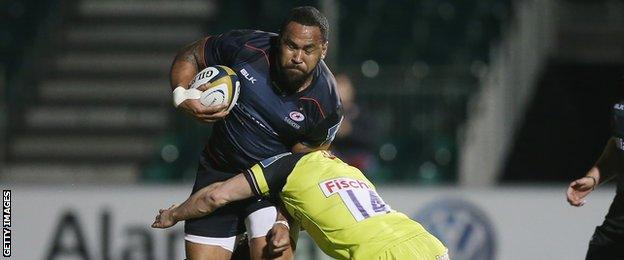
Glasgow signed Vunisa from European champions Saracens
"I was going to a foreign place where I didn't know anyone; I didn't have any family close by to support me if something went wrong. And, at 16, you really need support and guidance.
"I was lucky - we had a good crew, we went together and made our own family and looked after each other. We were pretty amazed by everything in New Zealand.
"I knew [Wanganui Collegiate] was pretty posh when I walked in. I was looking at what those guys were wearing, thinking my mum and dad would never get me this.
"You think back of home and my mum and dad always saying to appreciate what little things you have. And, if those kids can get it, why can't I?
"That was a driver for us to push on and be better - and hopefully be something that you dream of and want your parents to be proud of."
From Wanganui, Vunisa earned a berth in the Taranaki academy, supporting himself by working early factory shifts de-boning chicken carcasses and laying footpaths.
He laughs now at the memory of sneaking off with packets of poultry swiped from the production line, but there's a serious lesson at the heart of the tomfoolery.
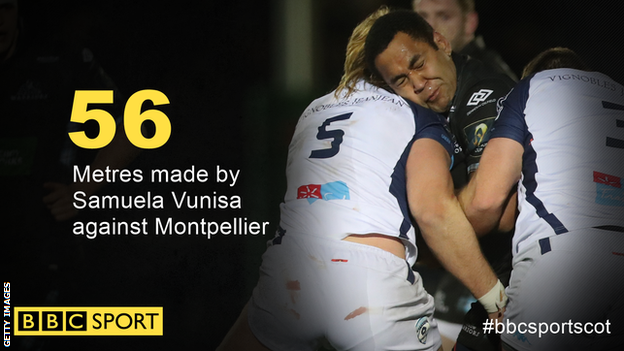
Vunisa made 56 metres from 11 carries in Glasgow's loss to Montpellier in France
"They were the good old days. Start at 4am, finish at 1pm. Then academy training and club training after. You get home at 8-9pm, knackered.
"It moulded me as a person. I never regret the process I came through.
"Working those kinds of jobs, it built me as a character and I'm grateful to have experienced that.
"When you go outside and see people doing roadworks or coming from factory work, they are never appreciated. You know what they're going through."
Taking up the chance to play for Calvisano in the Italian top flight, Vunisa began a four-year spell in his adopted nation that led to him joining the long list of Pacific Island players to qualify through residency and don the colours of another country.
Fiji, Samoa and Tonga have given rugby many of its most astonishing players. But, with ramshackle infrastructure and paltry resources, they are easy pickings for moneyed clubs abroad and agents seeking to plunder.
Teenagers from the same modest origins as Vunisa and his "crew" are parachuted into European academies, a searing and at times insurmountable transition for boys who long for a career in rugby that might better their lives and help haul their communities out of financial hardship.
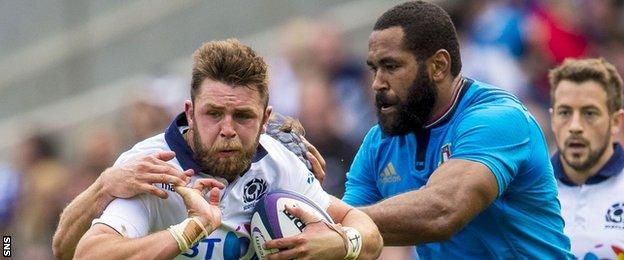
Three of Vunisa's 11 Italy caps have come against Scotland
The recently-founded Pacific Rugby Players Welfare, spearheaded by ex-Samoa lock Dan Leo, is doing sterling work to raise awareness and support islanders overseas, but it is only the start of a long and complex campaign.
"Nine times out of 10, you will never hear an island boy say anything, on the field or in training," says Vunisa.
"Our lifestyle is to respect what you've been told. What's been said, you do. You don't have to question it.
"That's a big problem for us. You've got a voice, you can use it. For us, it's head down, work and don't ask anything.
"We're lucky to have [former All Black and Scottish Rugby's international resettlement officer] Ben Atiga to be there for us and we help each other too.
"That's a big, big barrier for us islanders. We are always good in our comfort zone - it's when we're out of it that things are challenging.
"Everyone has got families and times are tough now, especially back home with the economy.
"We've got kids and it's not just the family we're feeding but the big villages, the community, the aunties, the uncles, everyone.
"When we are out there playing, we are not just playing for ourselves, you are playing for everyone back home and that's always the pressure of being an island boy.
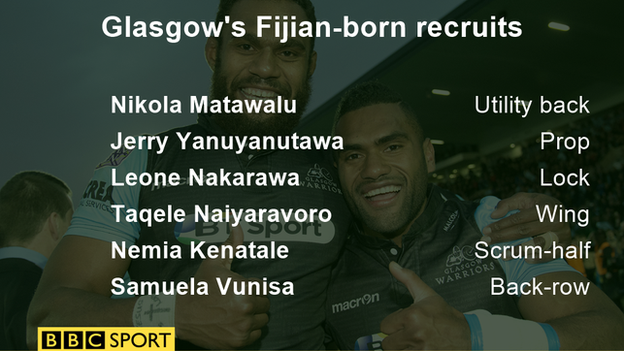
Glasgow have signed numerous Fijian-born players in recent seasons
"That's what you've been taught - if you are doing well, you are accountable for your family."
Vunisa is doing pretty well. He was signed by English titans Saracens and played for Italy during the World Cup in 2015.
His impact at Sarries was limited by injuries and the calibre of those also vying for game-time and he now finds himself tasked with adding ballast to a Glasgow side that has been beautiful but perhaps not brutal enough under Rennie's stewardship.
Warriors have swept all before them in the revamped Pro14, their breathtaking elan propelling them to 10 wins from 10, racking up more points and conceding fewer than any other side.
Yet, in the ruthless Champions Cup, Glasgow have faltered - and faltered badly. Four pool matches, four defeats.
The rugby is more fearsome here, errors more severely punished and Warriors have lacked the belligerence to handle the heavy artillery coming at them.
December defeats by Montpellier mean Europe is over for another season and now rivals Edinburgh lie in wait, itching to end that winning streak.
Rennie has taken his players to the sites of great Scottish battles, taught them the feats of Robert the Bruce and William Wallace - and has spent much of this week stressing that Warriors too must be prepared to scrap and slog.
"Dave and the coaches expect a lot of me - to be carrying the ball, to be physical. We've got a lot of workhorses in the forwards and they need some go-forward. That's where I come in.
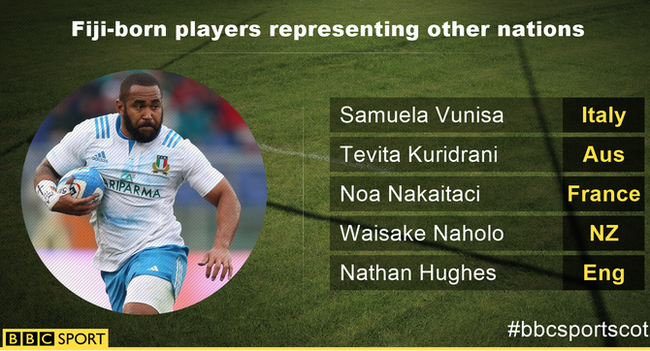
A host of Fijian-born players have chosen to represent other nations at Test level
"Now I know what being Scottish is, learning from those places we went. You really appreciate where you play for and what you do.
"You're not just playing for the jersey; you're playing for the community and what their history and past has been.
"These last few weeks, the forwards have been off our game. This week, we know it's a big one. We've got something to prove.
"We're expecting a very, very physical game. If you come for us, we'll come for you, one on one.
"That's what we live for and that's what we have to do this week."
Humble but unyielding - Vunisa's trademarks are precisely the qualities Rennie seeks in his players and his team.
- Published20 December 2017
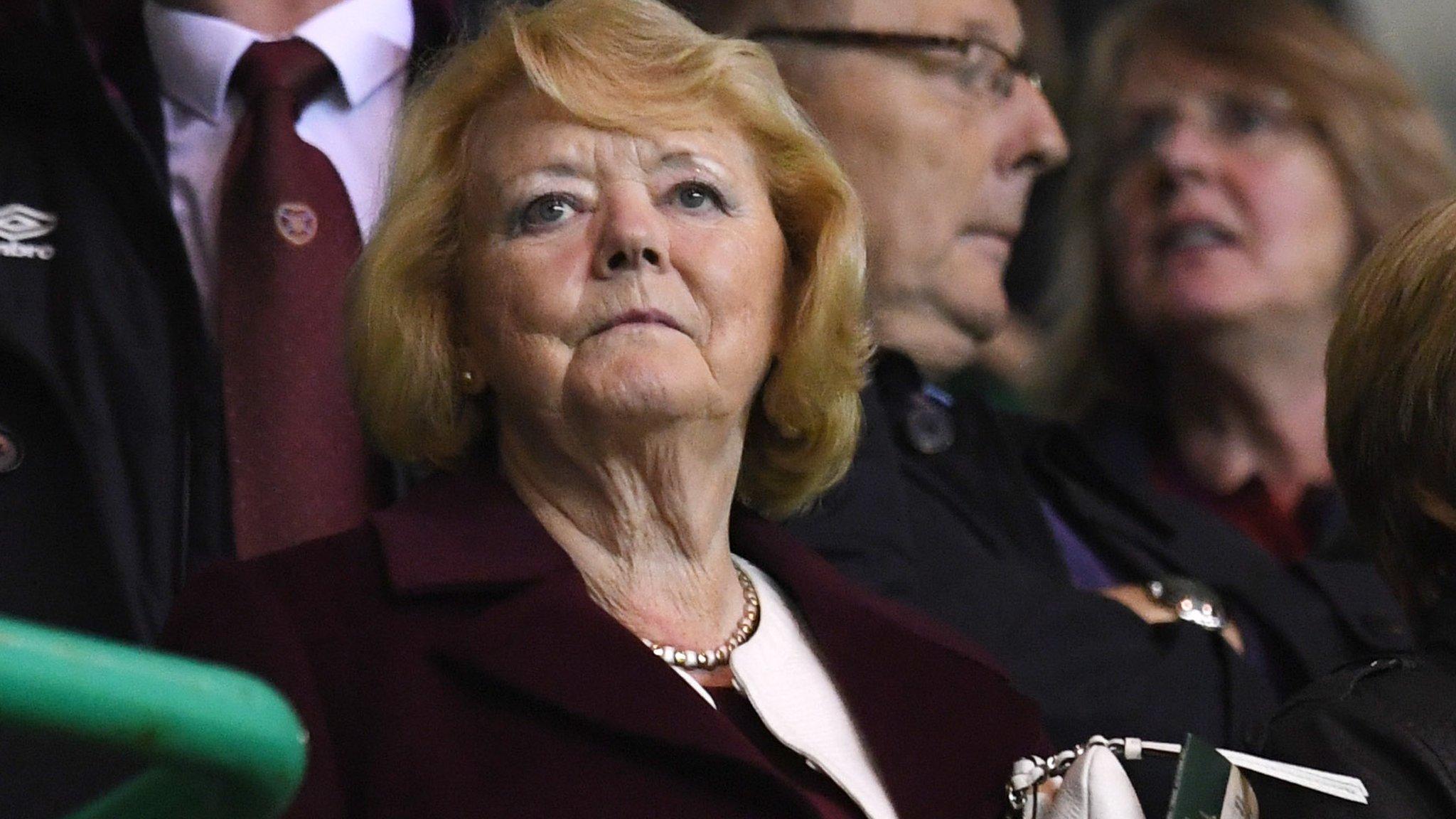
- Published19 December 2017
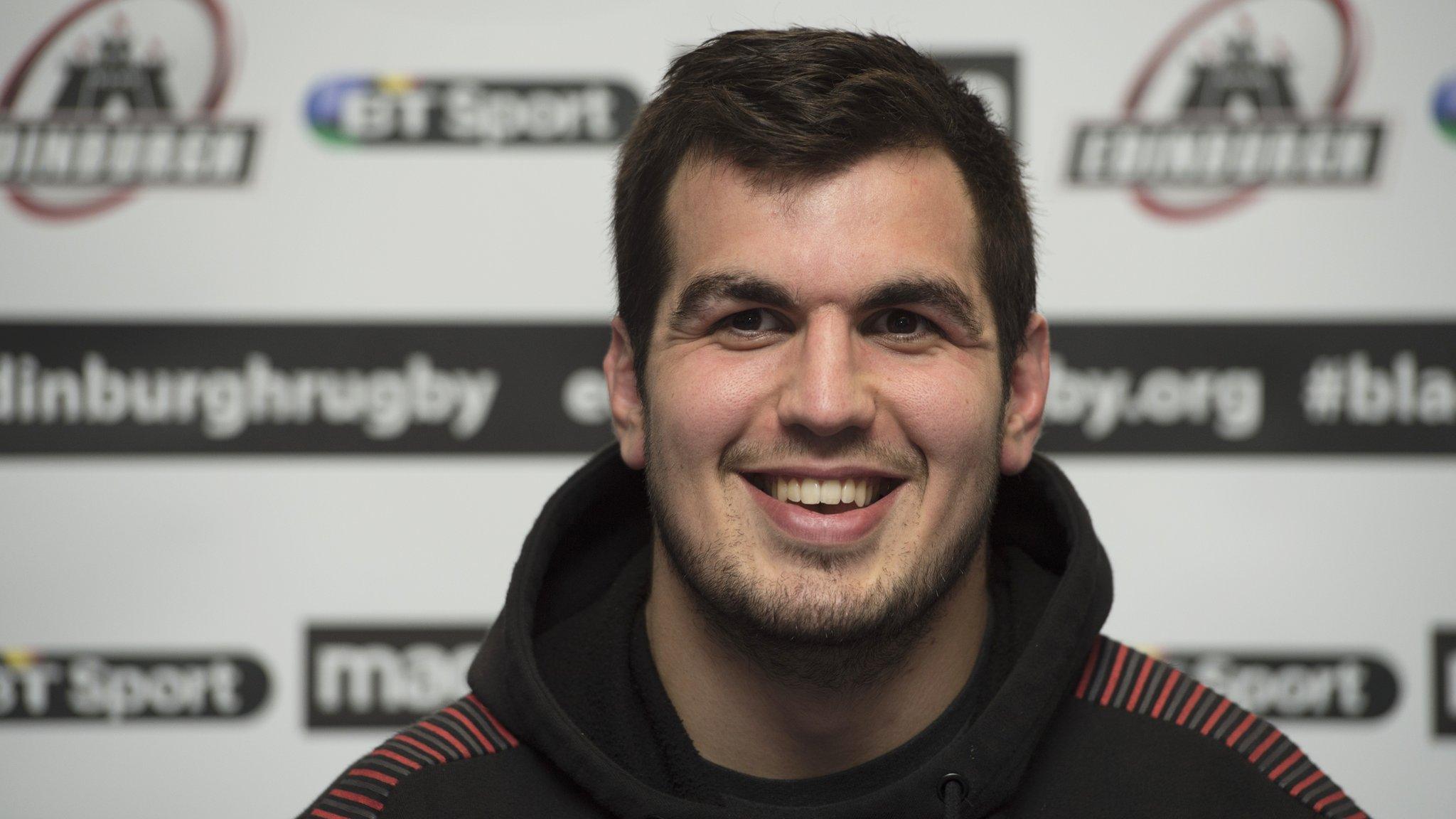
- Published19 December 2017
